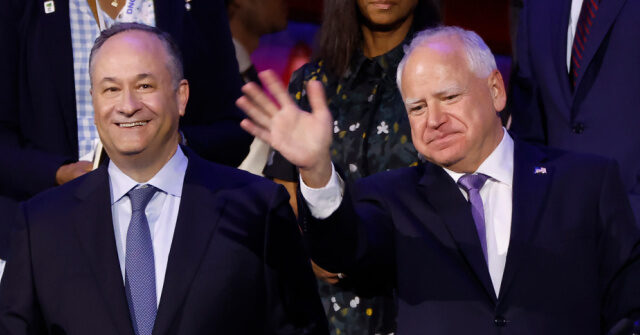On a seemingly ordinary day in Phoenix, Arizona, an incident involving Second Gentleman Doug Emhoff and Minnesota Governor Tim Walz stirred significant online discussion and critique. The two men casually left the counter of Otro Cafe without completing their payment, prompting Walz’s daughter to inform a staff member that someone would be returning to settle the bill. This moment, captured on video and widely shared on social media, portrayed a seemingly mundane interaction that quickly escalated into an embarrassment for the Democratic leaders involved. As they walked away, Walz’s daughter assured the cafe staff that a campaign staffer would come by to take care of the payment, underlining their reliance on assistance and, in turn, sparking public outrage.
The specific dynamics of the incident highlight a broader reality during a politically charged era. Many social media users erupted with criticism, drawing comparisons to the lived experiences of everyday citizens. Posts on X (formerly Twitter) conveyed sentiments that painted the two public figures as out of touch with average Americans. One commentator remarked that the two were similar to average people, since they seemingly left without paying, while others suggested that their behavior reflected a larger pattern of entitlement associated with political figures. The situation illustrates how even minor mistakes or missteps at public events can ignite conversations about privilege and accountability within the political sphere.
Walz and Emhoff’s visit to Otro Cafe coincided with the crucial first day of early voting in Arizona, an important moment that perhaps heightened the public scrutiny of their actions. The context of their stop—during a politically significant time—raised questions about the appropriateness of their conduct while representing their respective offices. Stephanie Murray, a national politics reporter, detailed their choices during the visit, noting that Walz’s order consisted of an iced tea and a morning bun. This seemingly casual outing, meant to engage with constituents and supporters, turned into a public relations misstep that undermined their intentions.
In light of the public’s reaction, journalist Ian Miles Cheong emphasized the embarrassment stemming from Walz and Emhoff’s actions by labeling them as a misunderstanding of middle-class norms. Such commentary reflects how actions of public figures are often scrutinized against the realities faced by constituents. Critics questioned whether those in positions of power can adequately relate to the average citizen’s circumstances if they inadvertently evoked an image of privilege or detachment. This incident thus serves as a reminder of the scrutiny that public figures face, particularly in a landscape where authenticity and connection with the public are increasingly valued.
Moreover, the commentary surrounding the incident reflects a growing narrative of distrust toward political leaders. People expressed frustration with how elected representatives might not hold themselves accountable in the same way expected from the general public. Accusations of entitlement resonate deeply, especially during times when many Americans are burdened by economic challenges. Such criticisms reflect the tension between the roles of public servants and their connections to the electorate, as constituents question whether leaders genuinely understand the struggles faced by ordinary citizens.
Ultimately, the Otro Cafe incident encapsulates a broader discourse regarding political accountability and the everyday realities faced by constituents. The episode highlights how minor incidents can capture public sentiment and provoke larger conversations around privilege, responsibility, and the disconnect some individuals perceive between themselves and their leaders. With social media amplifying these sentiments, such moments offer a reminder of the significant relationship between public figures and the communities they serve, further emphasizing the need for accountability in public service. As Walz, Emhoff, and others navigate their roles, these reflections may shape their future interactions and communications with constituents as they strive to bridge any perceived gaps.

